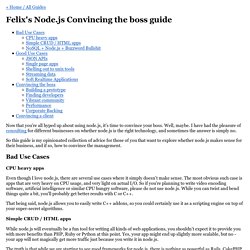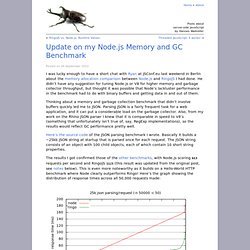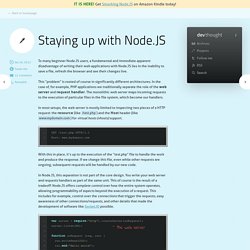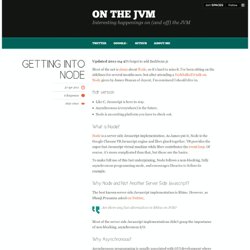

Why should I get started with Node.js? - rain. How do I get started with Node.js. Felix's Node.js Convincing the boss guide. « Home / All Guides Now that you're all hyped up about using node.js, it's time to convince your boss.

Well, maybe. I have had the pleasure of consulting for different businesses on whether node.js is the right technology, and sometimes the answer is simply no. So this guide is my opinionated collection of advice for those of you that want to explore whether node.js makes sense for their business, and if so, how to convince the management. Bad Use Cases CPU heavy apps Even though I love node.js, there are several use cases where it simply doesn't make sense. That being said, node.js allows you to easily write C++ addons, so you could certainly use it as a scripting engine on top of your super-secret algorithms. Simple CRUD / HTML apps While node.js will eventually be a fun tool for writing all kinds of web applications, you shouldn't expect it to provide you with more benefits than PHP, Ruby or Python at this point. Mixu's Node book - Table of Contents.
Node.js PaaS: Nodejitsu (part 1 of 3) - startups & node.js. Max Ogden Blogotronz. Description of and notes on the node.js Stream API There is also a screencast version of this article. node bills itself as JavaScript evented I/O.

In a nutshell that means if you are trying to solve a problem that is I/O bound (the limiting factor is reading/writing to relatively slow interfaces) then node can provide some useful abstractions to you. An example is if you are writing an application that has to talk to multiple databases, a caching layer, a load balancer, external web services, mobile clients, third party auth providers and serve web applications then node acts as a nice glue between all of the things.
"Streams in node are one of the rare occasions when doing something the fast way is actually easier. -@dominictarr in his high level node style guide The main tool in node's evented toolbox is the Stream. Readable Readable streams can also be paused and resumed, and it's up to the Stream implementer to write the pause() and resume() methods. Writable. Update on my Node.js Memory and GC Benchmark - Hannes Wallnöfer. Posted on 29 September 2010 I was lucky enough to have a short chat with Ryan at JSConf.eu last weekend in Berlin about the memory allocation comparison between Node.js and RingoJS I had done.

He didn’t have any suggestion for tuning Node.js or V8 for higher memory and garbage collector throughput, but thought it was possible that Node’s lackluster performance in the benchmark had to do with binary buffers and getting data in and out of them. Thinking about a memory and garbage collection benchmark that didn’t involve buffers quickly led me to JSON. Parsing JSON is a fairly frequent task for a web application, and it can put a considerable load on the garbage collector. Also, from my work on the Rhino JSON parser I knew that it is comparable in speed to V8’s (something that unfortunately isn’t true of, say, RegExp implementations), so the results would reflect GC performance pretty well. Here’s the source code of the JSON parsing benchmark I wrote. Performance Profiler for Node.js. My Node.js Linksheet - Progstr Filer. Recently I have been looking around the internet for various info about Node.js.
At first, my intent was to make some sort of infographic on the topic, but later I have changed my mind. I like infographics a lot, but they have an important limitation - their links aren't clickable. That is why I have decided to simply categorize the information and share it. Hopefully, someone will benefit from that. In case you think that something has to be added or changed, please, share it in the comments below.
Anode@microsoft. Staying up with Node.JS. To many beginner Node.JS users, a fundamental and immediate apparent disadvantage of writing their web applications with Node.JS lies in the inability to save a file, refresh the browser and see their changes live.

This “problem” is rooted of course in significantly different architectures. In the case of, for example, PHP applications we traditionally separate the role of the web server and request handler. The monolithic web server maps incoming requests to the execution of particular files in the file system, which become our handlers. In most setups, the web server is mostly limited to inspecting two pieces of a HTTP request: the resource (like /test.php) and the Host header (like www.mydomain.com) for virtual hosts (vhosts) support. Creationix/nvm - GitHub.
Plugins/Modules/Etc | node.js. Programs | node.js. Tutorials/Guides/Etc | node.js. A Node.js Podcast. Nodebits - Bits of inspiration to keep the node spirit alive. Getting into Node. Updated 2011-04-27: forgot to add Backbone.js Most of the net is abuzz about Node , so it’s hard to miss it.

I’ve been sitting on the sidelines for several months now, but after attending a TechTalksTO talk on Node given by James Duncan of Joyent, I’m convinced I should dive in. tl;dr version Like C, Javascript is here to stay. Asynchronous (everywhere) is the future. What is Node? Node is a server side Javascript implementation. To make full use of this fast underpinning, Node follows a non-blocking, fully asynchronous programming mode, and encourages libraries to follow its example. Why Node and Not Another Server Side Javascript? The best known server side Javascript implementation is Rhino.
Are there any fast alternatives to Rhino on JVM? Most of the server side Javascript implementations didn’t grasp the importance of non-blocking, asynchronous I/O. Why Asynchronous? Asynchronous programming is usually associated with GUI development where everything is event driven and asynchronous. Node.js. Joyent/node - GitHub.